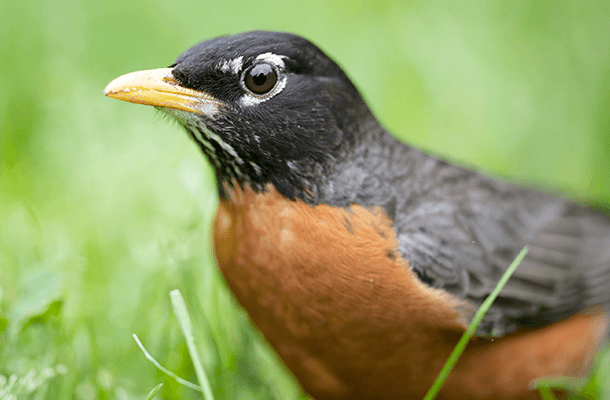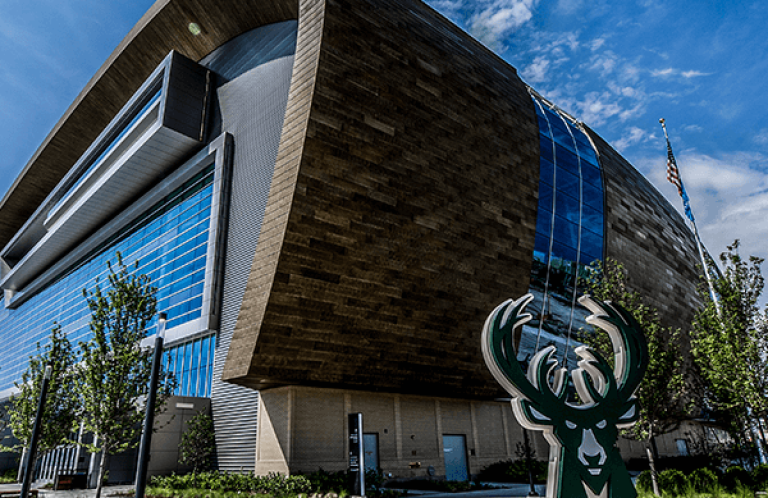It's Official: Wisconsin Will Build with Birds in Mind

Bird conservation groups are celebrating the survival of Madison, Wisconsin's bird-friendly building ordinance after years of legal challenges from developers. Following the ruling, the City will continue to require bird-friendly building designs that prevent window collisions. American Bird Conservancy (ABC), Southern Wisconsin Bird Alliance (formerly Madison Audubon), and Wisconsin Society for Ornithology are encouraging municipalities to move ahead with their own efforts to assure building designs protect wild birds from colliding with windows.
Window collisions are a major source of bird mortality, killing up to 1 billion birds in the United States each year. Collisions happen on all types of buildings, from multistory commercial buildings to private residences. Tackling this issue calls for thinking big like the City of Madison did with its ordinance, which requires new large construction and expansion projects to use bird-friendly strategies and materials.
“This is a huge victory not only for the City of Madison but also for birds,” said Bryan Lenz, Glass Collisions Program Director at ABC. “Window collisions are a conservation crisis that is decimating bird populations. We should be doing everything in our power to ensure that we design buildings that minimize impacts on wildlife.”
Shortly after the City's Common Council unanimously passed the state's first bird-friendly building design ordinance in August 2020, a group of builders and realtors sued, contending that the ordinance conflicted with the state's uniform building code (Dane County Case Number 2021CV001729).
ABC, Southern Wisconsin Bird Alliance, and Wisconsin Society for Ornithology filed an amicus curiae brief in support of the ordinance. The Honorable Nia Trammell, presiding, cited the brief extensively in ruling in favor of the City.
The plaintiffs appealed to the Wisconsin Court of Appeals (Appeal Number 2022AP1468), where the three conservation organizations again filed an amicus brief. The Appeals Court affirmed Judge Trammell's decision and the plaintiffs did not seek Wisconsin Supreme Court review. With the case now over, the City can continue to save countless birds from window collisions by requiring bird-friendly building design.
“We were eager to file a brief with our partners,” said Jennifer Lazewski, Wisconsin Society for Ornithology's Executive Director. “It was an opportunity to educate developers and the public about the significant threat that window collisions pose to birds. We needed to make sure that the court was aware of the problem and the available solutions.”
Birds experience the world differently. They perceive vegetation, sky, and landscapes reflected in glass to be real and attempt to fly to open spaces and habitat they glimpse through glass. Deaths from window collisions are largely preventable through the use of bird-friendly design, a set of practices that minimize the use of glass or make glass more visible to birds. For example, use of subtly patterned glass, solar shading, and insect screens are scientifically shown to reduce collisions, as does avoiding design features like glass banisters that consistently cause collisions.
According to Matt Reetz, Executive Director of Southern Wisconsin Bird Alliance, “Birds matter, and we need to be thoughtful and invest in their protection. Birds contribute billions of dollars to our economy through outdoor recreation and provide free ecosystem services, like pest control. Plus, they bring joy and emotional health benefits to people everywhere. Birds are not a luxury, they're an absolute necessity.”
Given the suit's potential to influence similar future ordinances throughout the state, ABC and Wisconsin's bird champions applaud the court's decision.
Making new and existing buildings safer for birds is possible and can be cost neutral if bird-friendly design is considered from the outset of a project. For simple guidance, including a model ordinance and top-rated resources, check out ABC's Legislative Toolkit.
Anyone can also help by making their windows at home bird-friendly. Learn how by visiting ABC's home-friendly solutions.
###
American Bird Conservancy (ABC) takes bold action to conserve wild birds and their habitats throughout the Americas. Inspired by the wonder of birds, we achieve lasting results for the bird species most in need while also benefiting human communities, biodiversity, and the planet's fragile climate. Our every action is underpinned by science, strengthened by partnerships, and rooted in the belief that diverse perspectives yield stronger results. Founded as a nonprofit organization in 1994, ABC remains committed to safeguarding birds for generations to come. Join us! Together, we can do more to ensure birds thrive.
Southern Wisconsin Bird Alliance (formerly Madison Audubon) is a nonprofit organization based in Madison and serving ten counties in southern Wisconsin. SoWBA provides land protection and restoration, environmental education for all ages, and science-based advocacy on behalf of its land and people. Visit swibirds.org to learn more or follow them on Facebook and Instagram (@swibirds).
The Wisconsin Society for Ornithology is a volunteer, nonprofit organization that was established in 1939. Our mission is to promote the enjoyment, study and conservation of Wisconsin's birds. We provide opportunities for all people to enjoy resident and migratory birds, while being a leading steward of and ambassador for Wisconsin birds. WSO sponsors birding field trips throughout the year, hosts an annual birding convention, publishes a quarterly journal and monthly newsletter, offers research grants, and serves as an informational resource center on bird-related issues. Membership exceeds 1,400 from across the United States and around the world.
Media Contact
Jordan Rutter
Director of Communications
media@abcbirds.org


















































